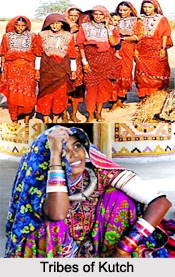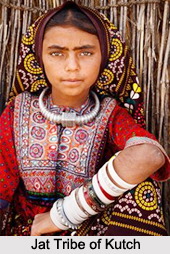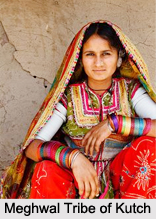 The different tribal groups that now live in Kutch have migrated there from countries as diverse as present day Pakistan, Afghanistan, Russia, Turkey, Iran and other areas in the Middle East and Central Asia.
The different tribal groups that now live in Kutch have migrated there from countries as diverse as present day Pakistan, Afghanistan, Russia, Turkey, Iran and other areas in the Middle East and Central Asia.
The textiles of each of these groups evolved through necessity as portable vessels, furnishings and items of clothing. Each community and tribal group has its own lexicon of motifs and embroidery stitches. Other craft techniques, such as batik and beading, have been imported into Kutch through sea trade with other countries.
Jats Tribe of Kutch: Jats are Sunni Muslims who are thought to have migrated to Kutch via Sindh in Pakistan from Iran as far back as the 5th century AD, continuing to about 16th century AD. Jats in Kutch are divided into 3 sub clans: Dhaneta Jats, who are settled cowherds; Garasia Jat who are settled farmers; and Fakirani Jats who are nomads.
Ahir Tribe of Kutch: Ahirs are Hindus who believe that they are the direct descendents of Lord Krishna. They migrated from Mathura to Kutch and neighbouring Saurashtra. Traditionally they were cattle herders and produced dairy products but now they are more likely to be engaged in agriculture or own and drive heavy haulage trucks. There are 4 main castes of Ahirs in Kutch; Prantharia, Mochhaya, Baureecha and Sorathia.
Rabari Tribe of Kutch: The Rabari"s lifestyle is completely different from any other tribe. The Rabaris move from one village to another by throwing away their house hold materials and small kids on a reverse bedstead kept on camel"s backs. Rabari people are a mystery of Kutch. The story of their origin is likely related with Lord Shiva doing self mortification in Himalayas.
North-west India has many castes of the Rabaris which are simply divided in 3 tribes in Kutch; Desi Rabaris, Dhebariya Rabaris and Vagadiya Rabaris. Desi Rabari live in the central and western sides of Kutch, Dhebariya Rabaris mainly live near Anjar Taluka and Vagadiya Rabaris live in the village named Vagad situated in the eastern side of Kutch.
Harijans Tribe of Kutch: The name Harijan was given by Mahatma Gandhi to the Meghwal people. "Hari" means God and "Jan" means People. Meghwals are a Hindu community who migrated from Marwar in Rajasthan to Sindh in Pakistan in the 17th century and then on to Kutch in 1971 after the Indo-Pak war. Their villages include Nirona, Zura, Biber, Kotai, Bhujodi, Sereli and Varnora. Meghwals are traditionally cowherds, singers and musicians. Meghwals often live and travel with Sodhas, with whom they share common embroidery styles and stitches.
Sodha Tribe of Kutch: Sodhas are traditionally Kshatriya, Rajput warriors and nobles. The Sodha continue very strict and conservative family and societal traditions, some of which may have developed because of living in a predominantly Muslim area for many centuries. Sodha women are not allowed to leave their villages.
Mutwa Tribe of Kutch: The Mutwas are a small group of Muslim cowherds who live in a small cluster of 11 villages in the Banni district of Kutch. They are culturally distinct, and claim to have migrated from the Middle East around the 16th century, probably in search of better grazing pastures.
Node Tribe of Kutch: The Node are a sub clan of the Muslim community, connected to, but separate from, the Mutwa. Originally they too lived in Banni, but water scarcity and lack of good grazing fields forced them to leave and they now live in the Anjar district of Kutch.
Related Articles
Indian Tribal People
Tribes of Gujarat
Indian Tribes
West Indian Tribes
Crafts of Gujarat
Ahir community
Jats
Rajputs
Kshatriyas
















